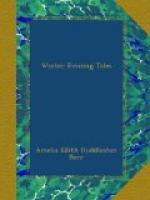“Deeper! dark, dark,
but yet I follow:
Tighten, dear
Lord, thy clasp.”
Ah! there was something touching and noble beyond all words, in this complete reliance and perfect trust; and it never again wavered.
“Is it very dark, Mary dear?” her friend said one morning, the last for her on earth.
“Too dark to see,” she whispered, “but I can go on if Christ will hold my hand.”
After this a great solemnity shaded her face; she lost all consciousness of this world. The frail, shadowy little body lay gray and passive, while that greatest of all struggles was going on—the struggle of the Eternal out of Time; but her lips moved incessantly, and occasionally some speech of earth told the anxious watchers how hard the conflict was. For instance, toward sundown she said in a voice strangely solemn and anxious:
“Who are we trying to
avoid?
From whom, Lord,
must we hide?
Oh! can the dying be decoyed,
With the Saviour
by his side?”
“Loose sands and all things sinking!” “Are we near eternity?” “Can I fall from Thee even now?” and ejaculations of similar kind, showed that the spiritual struggle was a very palpable one to her; but it ended in a great calm. For two hours she lay in a peace that passeth understanding, and you would have said that she was dead but for a vague look of expectancy in the happy, restful face. Then suddenly there was a lightening of the whole countenance; she stretched out her arms to meet the messenger of the King, and entered heaven with this prayer on her lips:
“Both hands, dear Lord, both hands.’”
Don’t doubt but she got them; their mighty strength lifted her over the dark river almost dry shod.
“Rests she not well
whose pilgrim staff and shoon
Lie in her tent—for
on the golden street
She walks and stumbles not
on roads star strewn
With her unsandalled
feet.”
THE HEIRESS OF KURSTON CHACE.
Into the usual stillness of Kurston Chace a strange bustle and excitement had come—the master was returning with a young bride, whom report spoke of as “bewitchingly beautiful.” It was easy to believe report in this case, for there must have been some strong inducement to make Frederick Kurston wed in his sixtieth year a woman barely twenty. It was not money; Mr. Kurston had plenty of money, and he was neither ambitious nor avaricious; besides, the woman he had chosen was both poor and extravagant.
For once report was correct. Clementina Gray, in tarlatans and flowers, had been a great beauty; and Clementina Kurston, in silks and diamonds, was a woman dedicated, by Nature for conquest.
It was Clementina’s beauty that had prevailed over the love-hardened heart of the gay old gallant, who had escaped the dangers of forty seasons of flirtation. He was entangled in the meshes of her golden hair, fascinated by the spell of her love-languid eyes, her mouth like a sad, heavy rose, her faultless form and her superb manners. He was blind to all her faults; deaf to all his friends—in the glamour of her enchantments he submitted to her implicitly, even while both his reason and his sense of other obligations pleaded for recognition.




